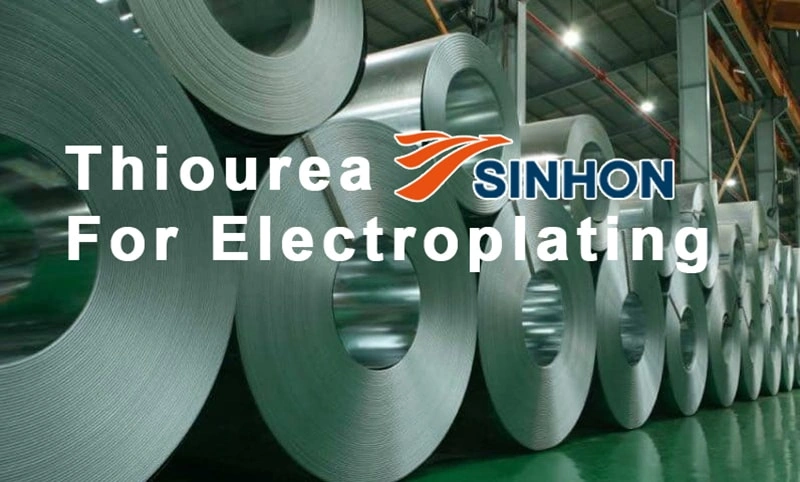03-Jan-2025

Thiourea (CS(NH₂)₂) is widely used as an additive in electroplating processes, especially in the electroplating of metals such as gold, silver, and copper. The use of thiourea produced by Sinhon Chemical can significantly improve the quality and performance of the electroplated layer. The following are the main differences between using thiourea and not using thiourea in electroplating processes:
| With thiourea | without thiourea | |
| 1. Surface quality | • Brightness: Thiourea can improve the brightness and flatness of the electroplated layer, making the surface of the coating smoother and more delicate. • Fineness: Thiourea helps reduce pinholes and bubbles on the surface of the coating, making the coating denser. | • Roughness: Without thiourea, the coating surface may appear rough and lack brightness. • More defects: The coating is prone to defects such as pinholes and bubbles, which affect the appearance and protection effect. |
| 2. Coating thickness uniformity | • Good uniformity: Thiourea can promote the current distribution during the electroplating process, making the coating thickness more uniform and avoiding the problem of local over-thickness or over-thinness. • Reduced edge effect: Thiourea helps to reduce the edge effect, that is, the phenomenon of over-thickness of the coating at the sharp corners of the parts, and ensure the uniformity of the entire coating. | • Uneven thickness: The coating thickness may be uneven, especially on workpieces with complex shapes, where some parts are easily over-coated and others are too thin. • Obvious edge effect: The coating is easily too thick at the sharp corners of the part, resulting in poor coating quality and appearance. |
| 3. Deposition speed | • Fast deposition speed: Thiourea can accelerate the reduction rate of metal ions on the electrode, thereby increasing the deposition speed and shortening the electroplating time. • High efficiency: Higher deposition speed means higher production efficiency and lower manufacturing cost per unit product. | • Slow deposition rate: Without thiourea, the deposition rate is slow and the electroplating time is long. • Low efficiency: The lower deposition rate may lead to low production efficiency and increase the manufacturing cost per unit product. |
| 4. Corrosion resistance | • Strong corrosion resistance: Thiourea can improve the crystal structure of the coating, forming a denser coating, thereby enhancing the corrosion resistance of the coating. • Good protective effect: A denser coating can better protect the substrate and extend the service life of the product. | • Weak corrosion resistance: The coating is not dense enough, easily affected by the external environment, and has poor corrosion resistance. • Poor protection effect: The coating has limited protective effect on the substrate, and the product is more susceptible to corrosion in harsh environments. |
| 5. Process stability and control difficulty | • Process stability: The addition of thiourea can make the electroplating process more stable and reduce process fluctuations. • Easy to control: Thiourea helps to adjust the pH value and other parameters of the electroplating solution, making the process parameters easier to control. | • Unstable process: Without thiourea, the electroplating process may fluctuate greatly, affecting the quality of the coating. • Difficult to control: The pH value and other parameters of the electroplating solution are difficult to maintain within an ideal range, which increases the difficulty of process control. |
| 6. Environmental and health impacts | • Low toxicity: Compared with some traditional additives, thiourea is less toxic and less harmful to operators and the environment. • Environmentally friendly: Thiourea has relatively few decomposition products in the electroplating solution, which reduces the difficulty of wastewater treatment. | • Substitution issues: If other additives are chosen to replace thiourea, more toxic substances may be introduced, increasing the risk of environmental and health hazards. |
The application of thiourea in the electroplating process can significantly improve the quality and performance of the coating, including improving brightness, refining the coating, enhancing corrosion resistance, accelerating deposition speed and improving process stability. In contrast, not using thiourea may lead to problems such as reduced coating quality and increased difficulty in process control. Therefore, in many cases, thiourea is an indispensable and important additive in the electroplating process. Sinhon Chemical is a manufacturer of high-quality thiourea and a reliable quality supplier. Sinhon thiourea is recommended for thiourea in the electroplating process. However, whether to use thiourea specifically needs to be considered comprehensively based on actual needs and technical conditions.
--END--

Sinhon Chemical focuses on high-quality thiourea production and manufacturing, 20,000 tons per year. We are also engaged in supply chain business, providing comprehensive solutions from products to users.
Excellent service, reliable quality, delivering more value.
Contact us to start our journey of cooperation.
Email: [email protected]